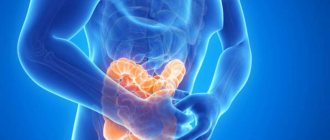The intestine is one of the main human organs. It performs vital functions: digests food, absorbs water and nutrients, forms and removes feces, provides protection against infectious agents and food allergens. Any malfunctions in its work affect a person’s well-being and negatively affect the general condition. An important indicator of organ health is regular cleansing.
The norm for bowel movements for adults is 1-2 times daily or every other day. These are averages. Some people feel great and do not experience digestive problems with a bowel movement frequency of once every three days. Others experience discomfort when stool is retained for only a few hours. Each organism is unique, so it is important to listen to yourself and not ignore signs of failure.
Normally, bowel movements occur regularly and without long straining. After excretion of feces, the urge completely disappears, there is no discomfort. Other indicators of normal digestion:
- daily amount of feces - 150-400 g,
- easy painless bowel movement,
- decorated cylindrical chair, 70% water,
- no strong unpleasant odor,
- stool acidity 6.8-7.6 pH.
If stool is delayed for 3 days or more, the urge to go to the toilet becomes frequent and painful, gas formation has increased and abdominal pain appears, measures must be taken to restore the normal frequency of bowel movements. To do this you need:
- adhere to the principles of proper nutrition - enrich your daily diet with fiber and drink at least 1.5-2 liters of liquid;
- take laxatives.
For chronic constipation, consultation with a gastroenterologist is necessary. The specialist will conduct a diagnosis, determine the cause of prolonged stool retention and prescribe effective treatment to bring bowel function back to normal.
According to statistics, bowel movements are disrupted in 30-50% of people. Deviation from the norm leads to constipation and deterioration of well-being. To restore normal bowel function and speed up the excretion of feces, experts advise using pharmaceutical drugs.
Laxatives for older people, pregnant and lactating women should be chosen especially carefully. A high-quality product does not contain senna and other dangerous ingredients, does not cause side effects and is suitable for long-term use. Fitomucil norm meets these criteria.
no.png
A significant increase or decrease in fecal mass is a kind of alarm signal. The main causes of polyfecality (increased amount of feces) include:
- disruption of digestive processes in the small intestine;
- eating a lot of fiber;
- increased peristalsis, in which beneficial substances from food do not have time to be completely absorbed due to its too rapid movement through the intestines;
- the presence of chronic pancreatitis, due to which there is a decrease in the exocrine function of the pancreas (proteins and fats are not completely digested);
- too small amount of bile entering the intestines (due to cholelithiasis, cholecystitis, etc.).
The main reasons for a decrease in the amount of feces include:
- the predominance of easily digestible foods in the diet;
- reducing the amount of food eaten;
- the presence of constipation, in which, due to prolonged retention of feces in the large intestine and maximum absorption of water, the volume of feces decreases.
Causes of very hard stool
Constipation often occurs in an adult, sometimes people simply do not pay attention to it and, if there is no serious pathology, then everything quickly returns to normal.
Lack of fluid may cause hard stool
If the body lacks moisture, the intestinal contents become more viscous, clay-like, and dry, which leads to hard stool or constipation.
An unbalanced diet may cause hard stool
Fiber is necessary for normal bowel function. We get it with vegetables, fruits, cereals, whole grain bread, and bran. If there is a lack of such products, the expected problems with stool arise. Especially if you also lean on baked goods and protein foods, such as meat, sour milk, eggs.
The more you sit or lie, the higher your risk of constipation.
A sedentary lifestyle may be the cause of hard stool
Lack of physical activity reduces muscle tone, including those directly responsible for regular bowel movements. The more you sit or lie, the higher your risk of constipation.
Age-related changes in the body can cause hard stool
As we age, muscle tone decreases and regular constipation is an expected consequence of this. It is especially important for older people to remain physically active.
Stress may cause hard stool
Especially protracted. With constipation, there is a multifactorial connection: stress worsens digestion, and also provokes a person to an unhealthy lifestyle (less sleep, more fast food and snacks on the go, coffee instead of water and the required amount of fluid in general).
no.png
A dark brown tint of stool may indicate the presence of disturbances in the digestion of food in the stomach, colitis, putrefactive dyspepsia. This color also predominates with constipation and following a meat diet.
Light brown is observed with increased intestinal motility and following a dairy-vegetable diet.
Orange is observed when consuming beta-carotene and foods high in it (for example, pumpkin, carrots, etc.).
A reddish color occurs when bleeding from the lower intestines (with anal fissures, hemorrhoids, ulcerative colitis, etc.), as well as when eating beets.
The green color is observed when eating a large amount of sorrel, spinach, lettuce, with increased intestinal motility or the presence of dysbacteriosis.
Light yellow stool indicates very rapid passage of feces through the intestines.
Black color - when taking activated carbon and bismuth preparations, eating blueberries, currants, bleeding from the upper gastrointestinal tract (cirrhosis, peptic ulcer, colon cancer), ingestion of blood during pulmonary or nasal bleeding.
Greenish-black stool may occur when taking iron supplements.
Grayish-white stool indicates that very little or no bile enters the intestines (acute pancreatitis, blockage of the bile duct, cirrhosis of the liver, hepatitis, etc.).
Very hard stool what to do
Painful passage of feces, abdominal pain, nausea, weakness - these are just the first symptoms of the disease, and then it will only get worse. In order to go to the toilet in a big way, you need to take certain measures, take thinning and emollients, and not hope for self-healing.
Preventive measures will help reduce the risk of hard feces if the problem is not caused by pathological diseases. This requires walks in the fresh air for 40-50 minutes every evening, separate meals, exclusion of fatty, fried foods, marinades and preserves. The consumption of clean, non-carbonated water should be increased to 2-2.5 liters per day. When nutrition does not help establish hard stools, medical help is required.
You can do cleansing enemas that improve intestinal permeability. Microenemas and enemas with decoctions of such medicinal herbs as motherwort, linden blossom, and chamomile have a good effect. It is recommended to do enemas daily for a week, then take a week break and repeat the treatment course again.
What else can you do to soften hard stool:
- replacing medications that cause constipation (if a person uses something to treat other ailments);
- prescription of mild laxatives – Mucofalk, Methylcellulose, etc.;
- use of medications with an osmotic effect: Sorbitol, Duphalac (not prescribed for gastrointestinal diseases);
- the purpose of glycerin and vaseline lubricants.
- physiotherapy;
- taking vitamins B1, ascorbic acid, retinol.

It is necessary to moisturize feces; to do this, drink at least 1.5 liters of water per day.
no.png
The presence of pathology is indicated by liquid, foamy, ointment-like, mushy, semi-liquid, excessively dense or putty-like stool.
- Pasty stools – with increased peristalsis, inflammation or increased secretion in the intestines.
- Very dense “sheep” feces - observed with spasms and stenosis of the colon, constipation.
- Ointment-like - observed in diseases of the pancreas, a sharp decrease in the flow of bile into the intestines.
- Putty-like or clayey stools are predominantly gray in color - with a large amount of undigested fat.
- Liquid - observed when the passage of feces is accelerated, absorption or the process of digesting food in the small intestine is impaired.
- Foamy - observed when fermentation processes in the intestines prevail over the rest.
- Liquid stool consistency and frequent bowel movements may indicate the presence of diarrhea.
- Thin, mushy or watery stool can occur with excessive water consumption.
Folk remedies for normalizing stool
Apple juice has a good laxative effect.
Constipation should be treated with herbs very carefully, since the cause of constipation is not always known. You need to be especially careful when using senna.
This herb acts quite aggressively on the intestines, enhances peristalsis, and can cause abdominal pain and diarrhea.
It is part of many drugs, but even in its pure form the body can have an unpredictable reaction. Laxative herbs such as senna should not be taken by pregnant women. They can cause uterine tone and cause miscarriage.
- Oatmeal jelly, oat decoction, and freshly squeezed apple or plum juice also have a good laxative effect.
- Teas with the addition of fruits and berries are healthy and safe. For example, you can add dried apples or cherries to green tea. This will help cope with constipation and strengthen the immune system.
- Chronic constipation can be treated with walnuts and milk. To do this, 100 g of nuts are thoroughly crushed, then a glass of milk is added and boiled for 5 minutes. The cooled and strained broth should be taken in a third of a glass up to 5 times an hour before meals.
- For constipation, you can take a teaspoon of castor oil. A laxative effect occurs 4-5 hours after administration. This remedy is prescribed in short courses; the oil cannot be taken continuously.
- As a remedy for constipation, traditional medicine also offers enemas with herbal decoctions, such as lemon balm and chamomile. You shouldn’t indulge in enemas without a doctor’s recommendation. They wash out the intestinal microflora, can provoke hemorrhoids and lead to weakened peristalsis.
- There is an excellent folk remedy that is often recommended by doctors - bran. They should be eaten by the tablespoon or added to food. Pure bran is sold in pharmacies in packaged form. According to the folk recipe, the bran should be steamed with boiling water, and after cooling, filter and eat the crumb.
- Flaxseed oil is a great remedy for constipation. In the morning on an empty stomach you need to drink a teaspoon of oil. This is very beneficial due to the fatty acids contained in the oil. Instead of flaxseed, you can use olive or regular sunflower oil.
- An excellent remedy for constipation is sauerkraut. You can eat it like this, drink warm brine. However, the brine should contain as little salt and pepper as possible.
Learn more about constipation and how to treat it in the thematic video:
Noticed a mistake? Select it and press Ctrl+Enter to let us know.
Problems with going to the toilet often occur in adults and children. Solid feces simply cannot leave the intestines, or it causes pain when exiting, causing a person to consciously suppress reflexes to defecate.
In this case, it is necessary to liquefy the feces as soon as possible so that this unpleasant condition passes quickly and all body functions are restored. How to soften stool at home will be described in this article.
Diagnostics

Diarrhea is usually an accompanying symptom of the underlying illness. To get rid of a disorder, it is necessary to establish the true cause of its occurrence. This requires a medical examination:
- Taking an anamnesis - in a conversation, the doctor establishes the nature and timing of the disorder. If mushy stool has been observed for a long time, it is most likely provoked by chronic diseases. If diarrhea appeared 2 days ago and develops rapidly, then it is caused by an infection.
- Laboratory tests - the patient takes a blood, urine, and stool test. If an infectious nature is suspected, a stool culture must be performed.
- Endoscopic examination - performed by probing. In this way, the condition of the stomach and duodenum can be assessed.
- Colonoscopy is an endoscopic examination of the large and small intestines. One of the best ways to identify pathologies and foci of inflammation.
- Ultrasound – allows you to assess the condition and functioning of the gastrointestinal tract.
[adsp-pro-5]
Important! The diagnosis is established only on the basis of the results of laboratory and instrumental examinations.
What are the dangers of long-term constipation?
With timely intervention and prevention, bowel retention does not have negative consequences; the patient, with the right diet, is able to quickly restore bowel function.
In an advanced situation, the situation can be aggravated by a serious complication: the formation of fecal stones, intestinal obstruction and peritonitis. Elderly people and bedridden patients suffer from such constipation.
The health of many organs and the entire digestive tract, as well as a person’s performance, depends on the functioning of the intestines, so it is not worthwhile to cause long-term retention of stool.









